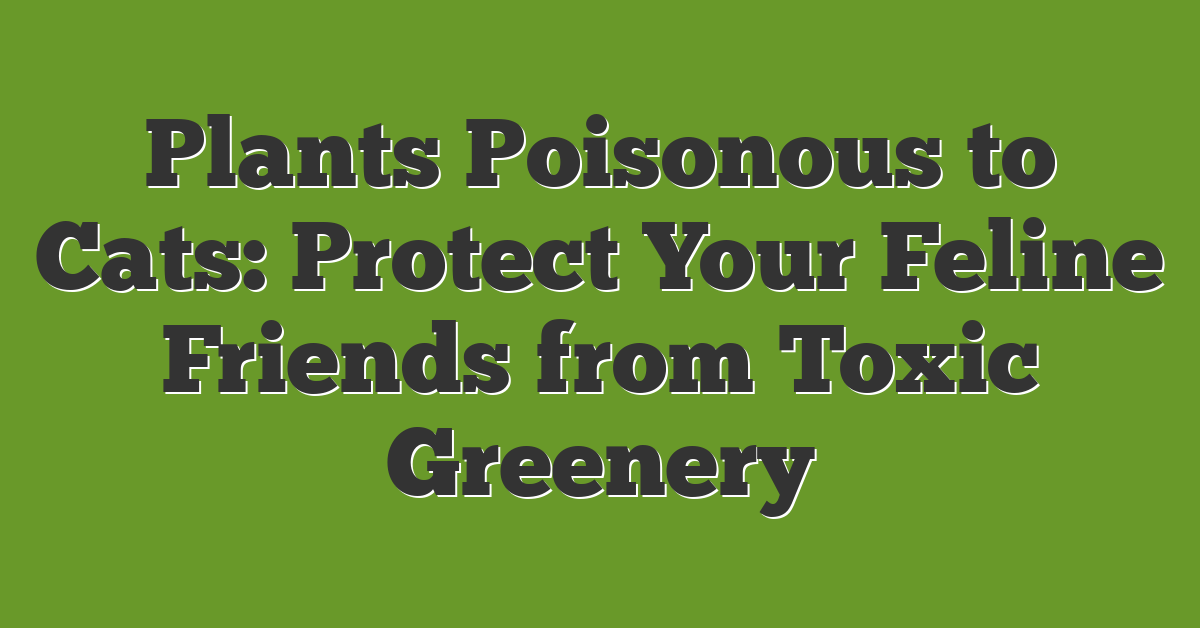Are you a cat owner who has experienced the unpleasant surprise of finding vomit on your carpet or furniture? Don’t worry, you’re not alone! Cats vomiting is a common issue that many pet owners have to deal with. While it can be concerning, it’s important to know that there are steps you can take to help your furry friend and prevent future incidents. In this article, we’ll explore what to do when cats vomit, including possible causes, when to seek veterinary care, and simple remedies you can try at home.

Nobody likes to see their beloved feline friend feeling unwell, especially when it involves vomiting. Understanding the potential reasons behind your cat’s upset stomach is the first step towards finding a solution. Cats can vomit for various reasons, such as hairballs, dietary indiscretion, or underlying medical conditions. Identifying the cause can help you determine the appropriate course of action. In this article, we’ll discuss the common causes of cat vomiting and provide guidance on how to address each situation effectively.
When your cat vomits, it’s natural to feel concerned and want to help them feel better. While some cases of vomiting can be resolved at home, others may require prompt veterinary attention. Knowing when to seek professional help is crucial for your cat’s well-being. In this article, we’ll outline the signs that indicate a trip to the vet is necessary and provide guidance on how to best care for your cat until you can get them the help they need. Stay tuned for valuable advice on what to do when your cat vomits.
Understanding the Causes of Cat Vomiting
As a cat lover, enthusiast, and expert, you know that cats can be mysterious creatures. One moment they’re purring contentedly in your lap, and the next moment they’re vomiting on the carpet. It can be concerning and frustrating when your feline friend is experiencing an upset stomach, but understanding the potential causes can help you take appropriate action.
Hairballs are a common culprit when it comes to cat vomiting. Cats are meticulous groomers, and they often ingest hair during their grooming sessions. This hair can accumulate in their digestive system, leading to an upset stomach and subsequent expulsion through vomiting. Regular brushing and the use of hairball prevention products can help minimize this issue.
Dietary indiscretion is another common cause of cat vomiting. A curious cat may eat something they shouldn’t, such as spoiled food or toxic plants. This can irritate their stomach and trigger vomiting as their body tries to eliminate the offending substance. It’s important to keep a watchful eye on your feline friend, especially when they have access to the outdoors.
Underlying medical conditions can also contribute to vomiting in cats. Gastrointestinal issues, such as inflammatory bowel disease, pancreatitis, or intestinal blockages, can cause persistent vomiting. Other conditions, such as kidney disease, liver disease, or hyperthyroidism, may also lead to gastrointestinal disturbances. If your cat’s vomiting is frequent, severe, or accompanied by other concerning symptoms, it’s crucial to seek veterinary attention.
Stress or anxiety can affect cats just like it does humans. Changes in their environment, such as moving to a new home or the addition of a new family member, can trigger stress-related vomiting. Providing a calm and stable environment, plenty of mental and physical stimulation, and considering the use of pheromone products can help alleviate their anxiety.
By understanding the potential causes of cat vomiting, you can better assess the situation and determine the appropriate course of action. While some cases can be resolved at home with simple interventions like hairball remedies or a temporary diet change, others may require immediate veterinary attention. Remember to consult with your veterinarian to ensure your beloved feline gets the care they need to feel better.
Recognizing the Signs of Cat Vomiting
As a cat lover, enthusiast, and expert, it’s essential to familiarize yourself with the signs of cat vomiting. Being able to recognize these signs early on can help you take appropriate action and ensure your feline friend receives the care they need. Here are a few key indicators to watch out for:
- Frequent gagging or retching: If you notice your cat gagging or retching multiple times within a short period, it could be a sign that they are about to vomit. Keep a close eye on them and be prepared to take action if needed.
- Excessive saliva: Cats experiencing nausea or on the verge of vomiting may drool or have excessive saliva in their mouth. Sometimes, you may even notice wet patches around their mouth or chin.
- Repeated attempts to vomit: You might observe your cat trying to vomit but without producing anything or only small amounts. This can indicate that there’s something irritating their stomach.
- Lethargy or changes in behavior: If your typically energetic and playful cat suddenly becomes lethargic, avoids interaction, or shows other behavioral changes, it could be a sign that something is wrong, including possible vomiting.
- Loss of appetite: Cats can lose their desire to eat or drink due to an upset stomach. A sudden decrease in food intake or a completely ignored meal might be a clear warning sign.
Remember, it’s important not to panic if you notice these signs. Cats can vomit for various reasons, as we discussed earlier. However, if your cat is experiencing frequent vomiting, shows other concerning symptoms like diarrhea, has pale gums, or appears to be in pain, it’s crucial to seek veterinary attention promptly.
Understanding the signs of cat vomiting allows you to be proactive in providing the care your furry companion needs. By paying attention to these indicators, you can take swift action and ensure your cat’s well-being. Stay tuned for the next section on what to do when your cat vomits to learn how to manage this common issue.
Steps to Take When Your Cat Vomits
As a cat lover, it can be distressing to see your furry friend vomit. However, as a cat enthusiast and expert, I’m here to guide you through the steps you should take when your cat vomits. Remember, staying calm is key to providing the appropriate care for your cat.
Firstly, if you notice your cat vomiting, observe their behavior. Are they retching frequently or making repeated attempts to vomit? These signs could indicate an underlying issue that requires veterinary attention. Additionally, take note of any changes in your cat’s behavior or appetite, as these can provide important insights into their overall health.
After observing your cat’s behavior, remove any obvious hazards from their surroundings. This could include plants, small objects, or potentially toxic substances. Ensure that your cat has access to fresh water to keep them hydrated, as dehydration can further complicate their condition.
Next, it’s important to monitor your cat’s vomiting. If the vomiting persists for more than a day or if your cat shows signs of distress, it’s time to seek professional help from a veterinarian. They will be able to assess your cat’s condition, provide a diagnosis, and recommend the appropriate treatment.
In the meantime, consider adjusting your cat’s diet. Hairballs are a common cause of vomiting in cats, so incorporating a specialized hairball control formula into their meals can help reduce this issue. Additionally, feeding smaller, more frequent meals and avoiding sudden dietary changes can also minimize the risk of vomiting.
Lastly, create a calm and stress-free environment for your cat. Stress and anxiety can contribute to bouts of vomiting, so make sure your cat has a quiet and comfortable space to rest. Offering them plenty of love and reassurance during this time can also help alleviate any anxiety they may be experiencing.
Remember, as a cat lover, your main goal is to provide the best possible care for your feline companion. By following these steps and seeking professional advice when needed, you can help ensure the well-being and health of your beloved cat. Stay vigilant, stay calm, and be there for your cat when they need you the most.
Tips for Preventing Cat Vomiting
As a cat lover, you want to do everything you can to keep your feline friend happy and healthy. One way to achieve this is by preventing cat vomiting. Here are some tips from a cat enthusiast and expert to help minimize the chances of your cat experiencing an upset stomach:
1. Choose a High-Quality Diet: Providing your cat with a balanced and nutritious diet is essential for their overall health. Opt for high-quality cat food that meets their specific dietary needs. Look for brands that have real meat as the main ingredient and are free from artificial additives or fillers.
2. Gradual Diet Changes: If you plan to switch your cat’s food, make sure to do it gradually. Sudden diet changes can upset their stomach and lead to vomiting. Start by mixing a small amount of the new food with their current food and gradually increase the proportion over several days.
3. Hairball Prevention: Cats groom themselves regularly and may swallow hair, leading to hairballs. Help prevent hairballs by brushing your cat’s fur regularly to reduce the amount of loose hair they ingest. Additionally, there are special cat foods and treats available that can help minimize hairball formation.
4. Avoid Feeding Human Food: While it might be tempting to share your meals with your furry friend, avoid feeding them human food. Many human foods, such as chocolate, onions, and garlic, are toxic to cats and can cause digestive issues or even poisoning.
5. Slow Feeding and Smaller Meals: Cats are prone to overeating, which can lead to vomiting. Consider using puzzle feeders or slow feeders to make mealtime more engaging and prevent them from eating too quickly. Splitting their meals into smaller, more frequent portions can also help.
6. Stress Reduction: Cats are sensitive creatures, and stress can contribute to vomiting. Provide your cat with a safe and calm environment, free from loud noises or constant disruptions. Place their litter box in a quiet location and offer hiding spots or elevated perches where they can retreat when feeling anxious.
7. Regular Veterinary Check-ups: Regular veterinary check-ups are crucial for maintaining your cat’s health. Routine examinations can help detect any underlying medical conditions that could potentially lead to vomiting. Your vet can also provide valuable advice tailored to your cat’s specific needs.
By implementing these tips into your cat’s daily routine, you can help prevent cat vomiting and promote their overall well-being. Remember
When to Seek Veterinary Help
As a cat lover, it’s important to recognize when it’s time to seek veterinary help for your furry friend. While occasional vomiting is common in cats, there are situations when professional assistance is necessary. Here are some signs that indicate it’s time to reach out to your veterinarian:
1. Frequent or Persistent Vomiting
If your cat is vomiting frequently or the vomiting persists for more than a day, it’s a red flag. This could be a sign of an underlying health issue that requires immediate attention. Your veterinarian can conduct a thorough examination to identify the cause and provide the appropriate treatment.
2. Blood in Vomit
The presence of blood in your cat’s vomit is never a good sign. It could indicate a serious condition such as gastrointestinal bleeding or stomach ulcers. Don’t hesitate to contact your vet and describe the situation – they will guide you on the next steps to ensure your cat’s health and well-being.
3. Lethargy and Other Abnormalities
If your cat is consistently vomiting and showing signs of lethargy, weakness, loss of appetite, or experiencing other abnormal behaviors, it’s crucial to consult with your veterinarian. These symptoms could be indicative of a more severe underlying problem that requires immediate attention.
4. Ingestion of Toxic Substances
Cats are curious creatures, and sometimes they may ingest toxic substances. If you suspect that your cat has ingested something harmful, such as chemicals, plants, or certain medications, don’t delay – contact your vet immediately. Time is of the essence in these situations, and prompt professional intervention can make a significant difference.
Remember, you know your cat best, and if something doesn’t feel right, trust your instincts. Seeking veterinary help promptly can prevent further complications and ensure a speedy recovery for your feline companion.
Conclusion
Taking appropriate action when your cat vomits is crucial for their well-being. By recognizing the signs and understanding the potential causes, you can provide the necessary care and support.
Observing your cat’s behavior and removing any potential hazards from their surroundings are important initial steps. Monitoring the vomiting and seeking professional help when needed ensures that your cat receives the appropriate treatment.
Adjusting your cat’s diet and creating a calm, stress-free environment can also help prevent future episodes of vomiting. Choosing a high-quality diet, preventing hairballs, and avoiding feeding human food are effective strategies. Practicing slow feeding, reducing stress, and scheduling regular veterinary check-ups are additional measures that can promote your cat’s overall health.
Remember, if your cat vomits frequently or persistently, shows signs of lethargy or other abnormalities, or has ingested a toxic substance, it is crucial to seek veterinary help promptly. Quick intervention can prevent complications and lead to a speedy recovery for your beloved feline friend.
By following these steps and providing the necessary care, you can help your cat feel better and maintain their overall well-being.












